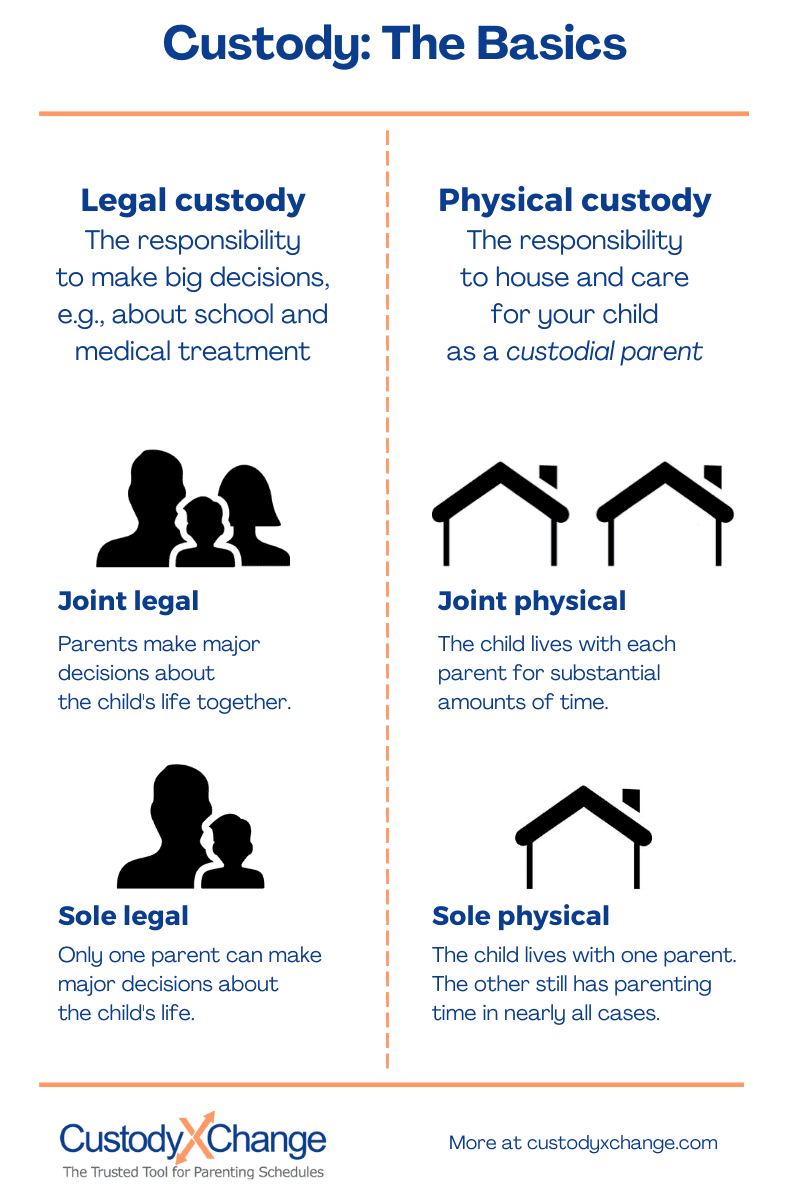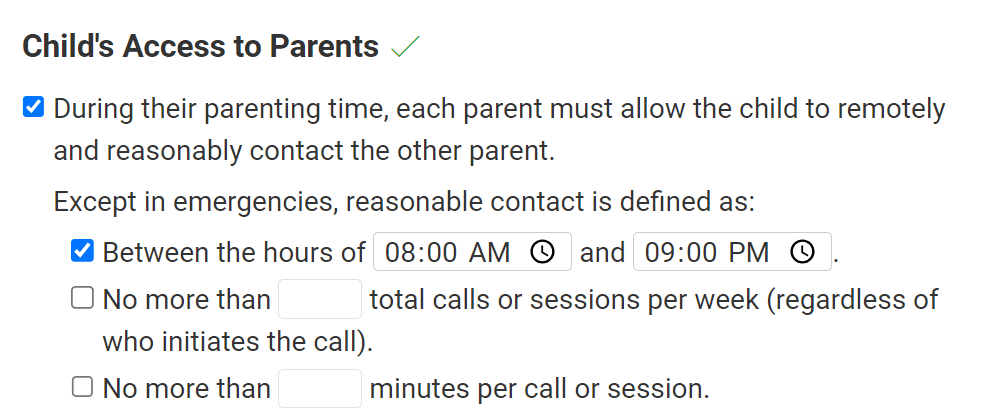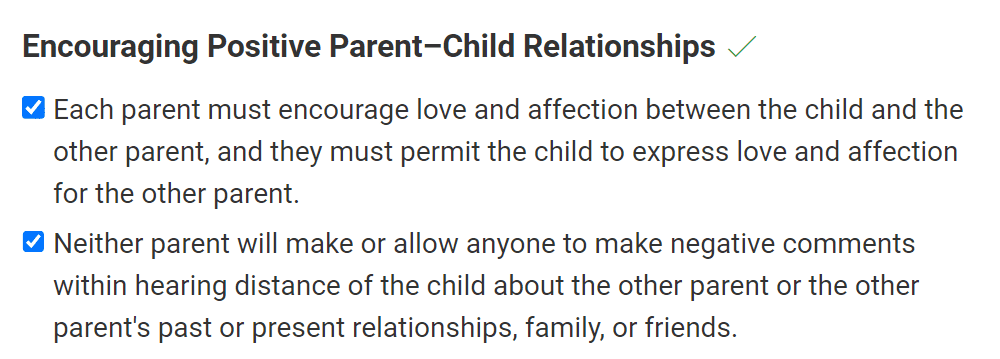Connecticut Parenting Plans and Custody Agreements
In Connecticut, you must propose a parenting plan as part of your divorce or custody case.
Though the court may not require much detail, remember that a parenting plan is meant to benefit your child. Write a solid proposal — with your co-parent or on your own — to let the court know exactly what you want.
Most co-parents eventually reach agreement. If you do, submit your agreed-upon plan as soon as possible so your case can wrap up. When you propose a plan that's in your child's best interests, the judge is likely to approve it.
How to write a parenting plan
You may use whatever format you like, as long as your plan includes the necessary information. The focus is limited to how you behave as a parent. Financial matters (including child support) typically go in a separate document.
One option is to use Connecticut's templates. Parents who agree on the same proposal can use the state's Custody Agreement and Parenting Plan. Parents who disagree can file a Proposed Parental Responsibility Plan. These forms are designed to collect the minimum information, and there isn't a lot of room for you to add detail.
Many parents use the Custody X Change parenting plan template, an online tool that offers more guidance.
If you have disagreements, a judge may assign a family relations counselor from Family Services to help you write your parenting plan.
What to cover: Custody
For decision-making responsibility for your child's health, education and religious upbringing, the court may award sole legal or joint legal custody.
For the responsibility to care for your child on a day-to-day basis, the court may award sole physical or joint physical custody. You may instead hear the terms primary custody or shared custody, respectively. Even when one parent has sole physical custody, the other usually has the right to significant time with the child.
 You can customize this to fit your situation with Custody X Change.
You can customize this to fit your situation with Custody X Change.
What to cover: Custody schedule
Make a custody schedule that's workable for everyone involved and that gives you and the other parent quality time with your child. The judge is more interested in a realistic, meaningful schedule than in one that splits the time exactly 50/50 between you.
When you create a schedule in Custody X Change, the app lets you easily pull a visual and written description into your parenting plan. It also calculates each parent's time for any period.
 You can customize this to fit your situation with Custody X Change.
You can customize this to fit your situation with Custody X Change.
What to cover: Parenting rules
In your parenting plan, you can include any parenting rules that help you care for your child. In Connecticut, the following provisions are popular.
How you'll transport your child
Envision how your child will go from your home to your co-parent's and back again. You can meet at one of your homes or at a neutral location like school.
What's the method of transport: public transportation or your own car? Can a grandparent or babysitter do the pickup and drop-off? Specify this in your parenting plan so you'll worry less.
 You can customize this to fit your situation with Custody X Change.
You can customize this to fit your situation with Custody X Change.
How you'll communicate outside your parenting time
When your child is with their other parent, you may want to contact them for any number of reasons: to ask if they've done their homework and if they've recovered from a cold, or just to ask how their day was and read them a bedtime story.
But your co-parent may want to limit these phone calls, just as you may want to limit your co-parent's calls when your child is with you.
If you'll limit these communications, say so in your plan. Establishing boundaries now prevents frustration later.
 You can customize this to fit your situation with Custody X Change.
You can customize this to fit your situation with Custody X Change.
How you'll talk about each other in front of your child
Nondisparagement is a fancy term for saying you won't insult or malign the other parent in front of your child. You can include a nondisparagement clause in your plan as a mutual reminder to be respectful, and you can simply point to it if an issue arises.
 You can customize this to fit your situation with Custody X Change.
You can customize this to fit your situation with Custody X Change.
How you'll handle moving
It can be helpful to say you'll work together in the event that one of you moves, and specifically that you'll reach agreement on how to modify your parenting plan rather than surprising each other or battling it out in court.
That's because Connecticut requires you to notify the other parent and the court in advance of a move that will affect your parenting. You'll have to prove to the court that you have a purpose for moving, that your move is reasonable and that it's in your child's best interests. It's better to work with your co-parent rather than against each other.
 You can customize this to fit your situation with Custody X Change.
You can customize this to fit your situation with Custody X Change.
If you need to change your parenting plan
The court may allow a modification if your circumstances have changed substantially or if it's otherwise in your child's best interest to change the order.
To modify your parenting plan, follow the Connecticut court instructions and pay the filing fee. You can ask for the fee to be waived if you can't afford it.
The easiest way to make a parenting plan
When you're writing a parenting plan, it's critical you use airtight language that leaves no room for interpretation. You must also be careful not to omit any information required by the court.
If you hire a lawyer, they'll write up the plan for you and ensure it meets the judge's expectations.
If you write your own plan, use technology to take guesswork out of the equation. The parenting plan template in the Custody X Change online app walks you through each step.
 You can customize this to fit your situation with Custody X Change.
You can customize this to fit your situation with Custody X Change.
The result is a professional document that demonstrates your competence as a parent from the first glance.
The easiest and most reliable way to make a parenting plan is with Custody X Change.
